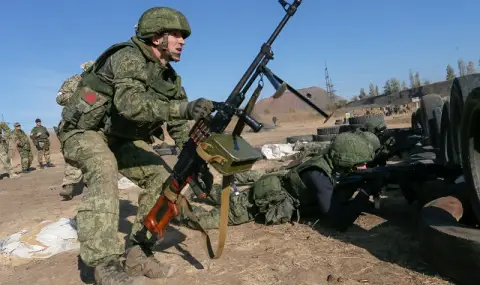Although Ukraine's Armed Forces conduct a victorious offensive on Russian territory, Kiev loses another key battle. Russia is close to winning the vital city of Pokrovsk in the Donetsk region, warns the British magazine The Economist.
Pokrovsk, with a population of 59,000, has been on the front line almost since the beginning of the war. But only in the last month has his future been seriously threatened. Russia sees its capture as a strategic goal, the achievement of which will launch an offensive against the major cities of Dnieper and Zaporozhye. Ukraine's great hope was that a surprise attack on Kursk would reduce the pressure. But the opposite happened - the advance of the Russian troops accelerated.
Pokrovsk is preparing for an unpleasant, new stage of the war. The district police and local administration withdrew. Two supermarkets have closed, the rest are likely to close as well. Locals line up outside banks and pension branches, rushing to get things done while they still can. Cars race at high speed in the city. On August 19, authorities urged residents to leave the city. Many heed the advice and leave with suitcases full of family heirlooms, some flee with refrigerators, Christmas trees, sofas, armchairs and mattresses.
The withdrawal of the VSU from Avdeevka in February and the failed rotation at neighboring Ocheretino in May set the stage for the attack on Pokrovsk. Now Russia is 10 kilometers from the city.
The Ukrainian command explains the Russian offensive in different ways. Some say that the ASU does not have enough shells, and the enemy - that they fire ten times more. Others point to Russian tactics - small infantry attacks, guided bomb strikes, new types of weapons for waging electronic warfare. But attrition and manpower issues appear to be at the root of the collapse.
"People are not made of steel," says Colonel Pavel Fedosenko.
According to him, the Ukrainian troops, outnumbered 4:1, are not resting. Some stay on the front lines for 30 or 40 days in foxholes, meters from death. A soldier with the call sign "Dublin", a fighter from the 59th Brigade, knows fighters who were in "ground zero" more than two months. Both suffered strokes.
Ukraine's sudden invasion of Russia is causing mixed feelings. Dublin says the early successes boosted morale, but it didn't last long. The hope that Russia might respond by moving troops from Pokrovsk was displaced by the realization that this would not happen. Ukrainian intelligence services confirm that Russia has redeployed troops from other parts of the eastern frontline, but has reinforced forces around Pokrovsk. Meanwhile, Ukraine redeploys units of special forces to Kursk, and the Pokrov Front is patched up by unverified formations.
"The Russians understood everything and did not fall into the trap”, complains Dublin.
Pokrovsk's defenders are not saying how long they will last. It could take the Russians weeks or months to capture remote towns like Mirnograd, Selidovo and Ukrainsk, which are now being attacked with drones, artillery and bombers. Progress has slowed since Aug. 19, said Alexander, commander of the 110th Brigade Air Force Unit, who monitors the battlefield from screens. But the Russians have a habit of attacking weak points with devastating effect, he warns. The fall of Pokrovsk, like Mariupol, Bakhmut and Avdiivka, seems only a matter of time.
What happens next is an open question. Control of Pokrovsk and a brief advance to the administrative borders of Donetsk Oblast may be enough for Vladimir Putin to declare a political victory and begin serious negotiations. Or maybe they aren't. Much will depend on whether Ukraine can hold on to the part of Russia it now occupies as a bargaining chip in these future negotiations.
The Economist: Vladimir Putin did not fall into the trap
Despite Ukraine's Armed Forces conducting a victorious offensive on Russian territory, Kiev loses another key battle
Aug 22, 2024 21:15 714
